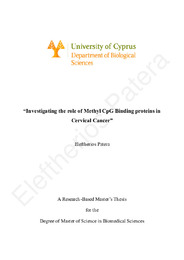| dc.contributor.advisor | Strati, Katerina | en |
| dc.contributor.author | Patera, Eleftherios | en |
| dc.coverage.spatial | Cyprus | en |
| dc.creator | Patera, Eleftherios | en |
| dc.date.accessioned | 2023-07-05T06:08:28Z | |
| dc.date.available | 2023-07-05T06:08:28Z | |
| dc.date.issued | 2023-05-12 | |
| dc.identifier.uri | http://gnosis.library.ucy.ac.cy/handle/7/65576 | en |
| dc.description.abstract | DNA methylation (5mC) is one of the main epigenetic modifications that drive gene regulation. Methyl CpG binding proteins (MBDs) bind methylated DNA and recruit the nucleosome remodelling and deacetylase complex (Nurd) that promotes transcriptional repression. Exogenous and endogenous factors can disturb the Nurd mediated epigenetic regulation and lead to silencing of tumour suppressor genes or reactivation of oncogenes, which can give rise to carcinogenesis. Cervical cancer (CC) is the fourth most common cancer type in women and maintains a respectable mortality rate in developing countries. Human papilloma viruses (HPVs) have been identified as the main risk factor for development of CC through the expression of their E6 and E7 oncogenes. Recent studies suggest that E7 can affect the MBD subunit composition of the Nurd complex resulting in a switch from a MBD2-Nurd to MBD3-Nurd. Yet, MBD2 and MBD3 have not been characterized in the context of CC development. To this end, in the current study we aimed to knock down MBD2 and MBD3 in C33A, a cervical cancer cell line and investigate their role and impact in CC. Our results suggest that MBD3 is important for CC cells to maintain high proliferation. More than that, core reprogramming transcription factors Oct4 and Sox2 are under MBD regulation in C33A cells. Furthermore, MBD2 knock down gave significant rise to chromatin hydroxy methylation (5hmC). Finally, we conclude that MBD3 is essential for CC growth and loss of MBD2 impacts genomic hydroxy methylation status, which could lead to transcriptional deregulation. | en |
| dc.language.iso | eng | en |
| dc.publisher | Πανεπιστήμιο Κύπρου, Σχολή Θετικών και Εφαρμοσμένων Επιστημών / University of Cyprus, Faculty of Pure and Applied Sciences | |
| dc.rights | info:eu-repo/semantics/openAccess | en |
| dc.rights | Open Access | en |
| dc.title | Investigating the role of Methyl CpG Binding proteins in Cervical Cancer | en |
| dc.type | info:eu-repo/semantics/masterThesis | en |
| dc.contributor.committeemember | Kirmizis, Antonis | en |
| dc.contributor.committeemember | Pitsouli, Chrysoula | en |
| dc.contributor.department | Τμήμα Βιολογικών Επιστημών / Department of Biological Sciences | |
| dc.subject.uncontrolledterm | CERVICAL CANCER | en |
| dc.subject.uncontrolledterm | METHYL CPG BINDING PROTEINS | en |
| dc.subject.uncontrolledterm | EPIGENETICS | en |
| dc.subject.uncontrolledterm | HUMAN PAPILLOMA VIRUS | en |
| dc.author.faculty | Σχολή Θετικών και Εφαρμοσμένων Επιστημών / Faculty of Pure and Applied Sciences | |
| dc.author.department | Τμήμα Βιολογικών Επιστημών / Department of Biological Sciences | |
| dc.type.uhtype | Master Thesis | en |
| dc.contributor.orcid | Kirmizis, Antonis [0000-0002-3748-8711] | |
| dc.contributor.orcid | Pitsouli, Chrysoula [0000-0003-4074-9684] | |
| dc.contributor.orcid | Strati, Katerina [0000-0002-2332-787X] | |
| dc.gnosis.orcid | 0000-0002-2332-787X | |
| dc.gnosis.orcid | 0000-0002-3748-8711 | |
| dc.gnosis.orcid | 0000-0003-4074-9684 | |

